
In the quiet moments of caregiving—late at night or early in the morning—it can feel like no one understands your struggles. Caregiver support groups remind you that you are not alone and offer a space to share your experiences. By connecting with caregiver support groups, you can find advice, encouragement, and empathy from others facing similar challenges. Joining caregiver support groups helps ease the isolation, creating a sense of community and understanding. Engaging with caregiver support groups allows you to feel supported while navigating the demanding responsibilities of caregiving.
Connecting with that community is one of the most powerful ways to support your well-being. This guide will help you find and engage with caregiver support groups, showing how these groups can provide both practical advice and emotional support. By exploring different types of caregiver support groups, you’ll see the benefits they offer for your daily caregiving journey. With the right caregiver support groups, you can connect with others who truly understand your experience, ensuring that family caregiving help is always within reach and that you never have to face this path alone.
What Exactly is a Caregiver Support Group?
At its heart, caregiver support groups provide a safe haven for those caring for a loved one. In caregiver support groups, people can share their experiences, exchange practical advice, and offer emotional support without fear of judgment. Joining caregiver support groups means connecting with others who understand the exhaustion, the challenges, and the emotional complexity of caregiving. By participating in caregiver support groups, you gain a community where your feelings are validated and your efforts are recognized, making the journey of caregiving more sustainable and supported.
The landscape of support groups in 2025 is more diverse than ever. As noted by organizations like the Family Caregiver Alliance, the rise of digital platforms has created a boom in specialized online communities, complementing traditional in-person meetings. The trend is toward hyper-focused groups, allowing a caregiver for a spouse with a rare neurological disorder, for example, to connect with peers facing the exact same challenges, no matter where they live.
The Life-Changing Benefits of Peer Support
Joining a support group is not just a nice idea; it’s a proven strategy for preventing burnout and improving your quality of life. The benefits are both immediate and long-lasting.
Shattering the Walls of Isolation
The simple act of hearing someone else voice your exact fears and frustrations is incredibly validating. It instantly breaks the illusion that you are alone in your struggles, creating a powerful sense of belonging and community that is a direct antidote to loneliness.
A Goldmine of Practical, Lived Advice
Forget generic advice. In a support group, you’ll get real-world tips from people who have been there. You’ll learn which adaptive equipment is actually worth the money, how to navigate a tricky conversation with a doctor, or the best way to handle a specific challenging behavior. This shared wisdom is invaluable.
A Safe Outlet for Difficult Emotions
It can be hard to express feelings of anger, guilt, or resentment to friends or family who don’t understand the context. A support group provides a confidential space to vent and process these normal, valid emotions without judgment, which is a critical component of mental health. Finding the right kind of family caregiving help, as detailed on sites like peternakan.web.id, can be transformative.
Finding Your Fit: Types of Caregiver Support Groups
Support groups come in many formats. Understanding the different types will help you choose the one that best suits your personality and needs.

1. In-Person Groups
These are traditional, face-to-face meetings, often held at hospitals, senior centers, or community buildings. They offer the benefit of direct human connection and are great for building local relationships.
2. Online Forums and Social Media Groups
Platforms like Facebook, Reddit, or dedicated websites host communities that are available 24/7. They are perfect for caregivers who can’t leave home easily, have irregular schedules, or are looking for a large pool of advice on a specific topic.
3. Disease-Specific Groups
Run by organizations like the Alzheimer’s Association or the American Stroke Association, these groups focus on a particular condition. They provide highly specialized information and connect you with others navigating the exact same medical journey.
The Power of Community: A Real-Life Scenario
Jenna was caring for her mother after a major stroke. Her friends were sympathetic, but they didn’t understand the day-to-day reality of aphasia and physical therapy. Feeling lost, she joined an online support group for stroke caregivers. The first time she posted a question about managing frustration during speech therapy, she received a dozen replies within an hour—all with compassionate advice and encouragement. For the first time, she felt truly seen. This experience highlights how finding the right caregiver support groups can be a turning point.
Choosing Your Platform: In-Person vs. Online
Each format has its own unique strengths. This table can help you decide which is a better fit for you.
| Feature | In-Person Groups | Online Groups |
|---|---|---|
| Accessibility | Limited to a specific time and place. | Available 24/7 from anywhere with an internet connection. |
| Connection | Deep, personal connection through face-to-face interaction. | Broader connection to a larger, more diverse group. |
| Anonymity | Less anonymous; requires sharing in front of local peers. | High degree of anonymity, which can encourage more open sharing. |
| Best For | Those who thrive on personal interaction and local networking. | Those with limited mobility, irregular schedules, or niche needs. |
Common Mistakes to Avoid When Joining a Group
To get the most out of the experience, be mindful of these common pitfalls.
- Waiting Until You’re in Crisis: The best time to find a support group is before you desperately need one. Join early to build relationships and learn coping skills proactively.
- Sticking with a Bad Fit: Every group has its own personality. If the first one you try doesn’t feel right, don’t give up. Try another. It’s like dating; sometimes it takes a few tries to find the right match.
- Just “Lurking” Online: While it’s fine to observe at first, you’ll get the most benefit by participating. Asking a question or offering a word of encouragement to someone else is how you build community.
- Comparing Your Journey: Every caregiving situation is unique. Use the group for support and ideas, not to compare your struggles or feel that you’re not doing enough.
Expert Tips & Best Practices
Use these insider tips to navigate the world of support groups effectively.

- Look for a Facilitator: “The best support groups, whether online or in person, have a skilled facilitator,” notes licensed clinical social worker, David Chen. “They keep the conversation on track, ensure everyone feels heard, and manage group dynamics.”
- Understand the Group’s Rules: A good group will have clear guidelines about confidentiality, respect, and staying on topic. This ensures it remains a safe space for everyone.
- Give as Much as You Take: Once you’ve been a member for a while, make an effort to welcome newcomers and offer your own hard-won advice. This reinforces your own learning and strengthens the group.
- Use It as a Springboard, Not a Crutch: A support group is a vital tool, but it’s part of a larger self-care plan that should also include respite, personal time, and professional help if needed.
Frequently Asked Questions (FAQ)
Q: Where is the best place to start looking for a local caregiver support group?
A: The best starting points are your local Area Agency on Aging, the Family Caregiver Alliance website, and major disease-specific organizations like the Alzheimer’s Association or American Cancer Society. Local hospitals and senior centers are also excellent places to check for listings.
Q: Are online support groups really as effective as in-person ones?
A: Yes, for many people they are equally or even more effective. Online groups offer 24/7 accessibility, anonymity, and the ability to connect with a highly specific peer group (e.g., caregivers for a rare disease). The best format depends entirely on your personality and logistical needs.
Q: What if I am an introvert and feel anxious about sharing with strangers?
A: That’s a very common concern. Most support groups do not require you to speak. It is perfectly acceptable to attend and just listen for your first few meetings. Online forums where you can remain anonymous can also be a great, low-pressure way to start.
Q: What is the difference between a support group and group therapy?
A: A support group is typically a peer-led gathering focused on shared experiences, mutual support, and practical advice. Group therapy is a formal mental health treatment led by a licensed therapist, focused on processing emotions and learning clinical coping strategies. Both are valuable, but they serve different purposes.
Q: How much do caregiver support groups cost?
A: The vast majority of caregiver support groups, both online and in-person, are completely free. They are typically run by non-profit organizations, hospitals, or volunteers. You should be wary of any group that asks for a significant fee to join.
Conclusion
You carry a heavy load, but you do not have to carry it alone. Joining caregiver support groups can provide the emotional relief and practical advice you need. Caregiver support groups are more than just a resource—they offer human connection and understanding from people who truly get your experience. By participating in caregiver support groups, you create a network that helps sustain you, reduce stress, and share strategies. Taking the first step to engage with caregiver support groups is an investment in your own well-being and the quality of care you provide to your loved one.
For a national directory of support groups, visit authoritative sources like the AARP Family Caregiving forum. Your community is out there waiting for you.
What type of support group do you think would be most helpful for you? Share your thoughts in the comments!
